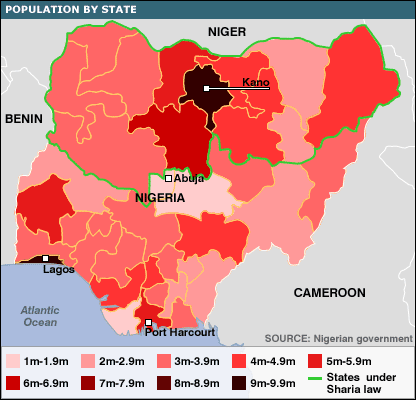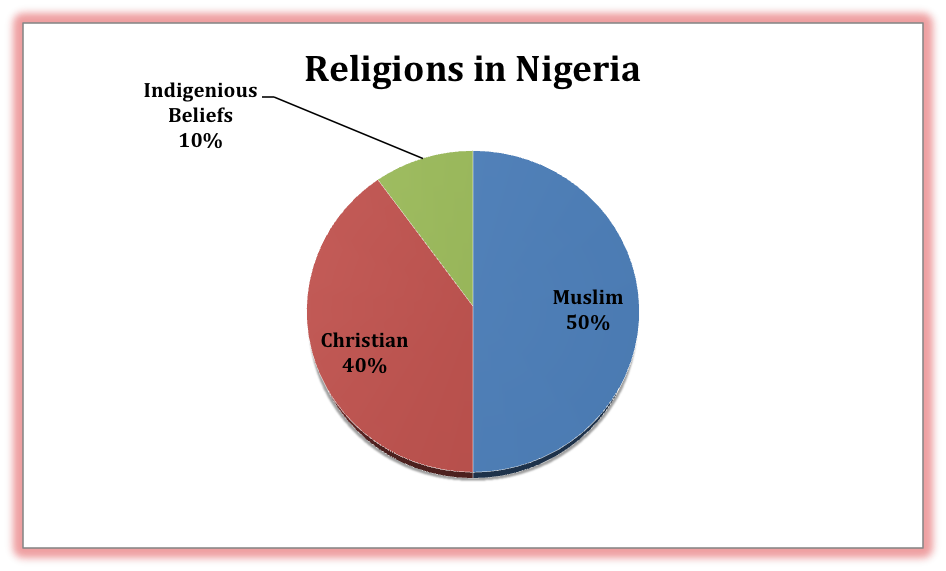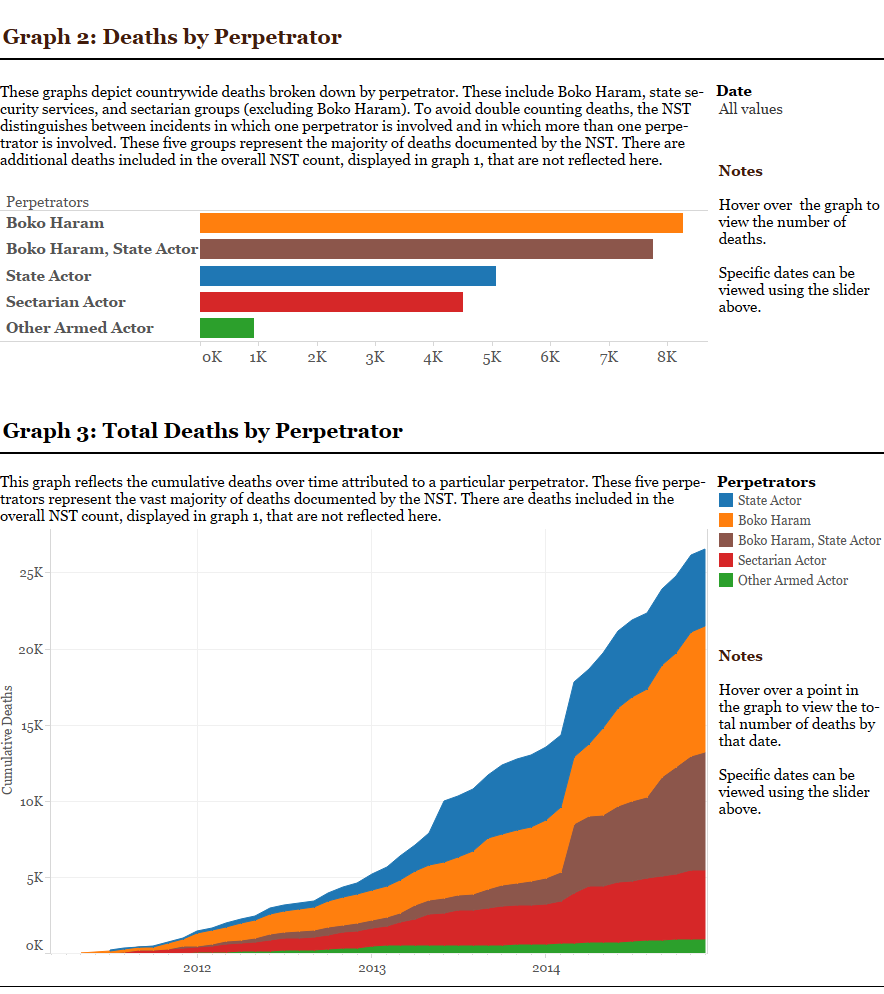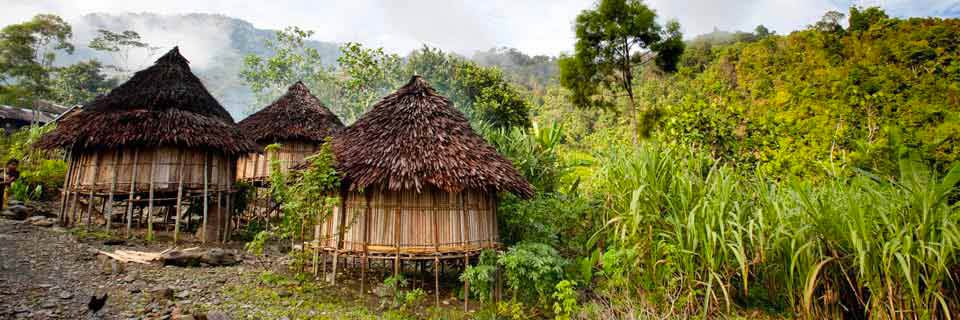 NIGERIA
NIGERIA
Nigeria’s demographic profile is one key factor in the emergence of a group such as Boko Haram. Combined with the country’s history, religious dynamic, politics and economy, Nigeria has favorable conditions for a terrorist organization such as Boko Haram to exist and succeed.
Nigeria hosts the largest population in Africa. The current tally seems to be around 182 million, with a large percentage (71%) of the population being under the age of 30, while 40% are under the age of 14.
Nigeria has a high fertility and birth rate, with each women having an average of 5 children, and low life expectancy (age of 50). Many areas are unimproved in respect to drinking water and sanitation. HIV/AIDS and other communicable diseases are still factors in mortality.
The World Bank Data on Nigeria
Nigeria enjoys a wealth of natural resources. Large productive agricultural land, oil, natural gas and minerals, along with its urbanization rate of 50%, position the country to enjoy economic growth and prosperity. However, critics argue that the resources have been squandered due to corruption, sectarian violence, poverty; pointing to a lack of leadership.
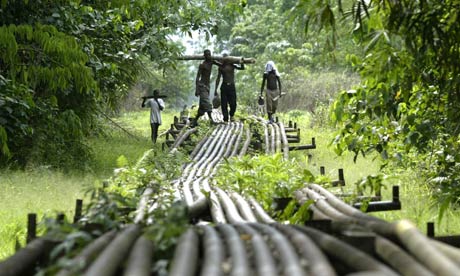
Recent critics of President Jonathon’s administration cite him for not having protected Nigeria’s future and his handling of Boko Haram. The President is being faulted, among other things, for not storing up Nigeria’s foreign oil reserves during the high price boom. To read the entire story, click here.
Poverty

70% Nigerians live below poverty line. The conflict is being sustained by masses of unemployed youth who are susceptible to Boko Haram recruitment.
The inability to provide sufficient water, health care, infrastructure, security, power or education has caused an unshakable resentment and fed extremist ideology.
Poverties.org concurs that “poverty fuels terrorism by creating a sate of misery and frustration that pushes people to join terrorist organizations.” They list the following causes of poverty in Africa:
- Unemployment
- Bad leadership/Poor governance
- Corruption
- Excessive reliance on foreign culture/products
- Poor economy
- Illiteracy
Poverties.org also proposes the following steps/changes in eliminating poverty in Africa:
- Good governance and leadership-a government to effective address issues of unemployment, welfare, social infrastructure and corruption.
- Invest heavily in agriculture and industry
- Education-develops productivity and creativity; stop the brain drain
- Teach family planning
Religion in Nigeria is comprised of either Muslim or Christian belief with 10% of the population subscribing to more traditional, sect type practices. The Muslim North and Christian South has been used in political play for power. These skirmishes make up the “Middle Belt”, where the groups converge.
Ethnic divisions tend to coincide somewhat with religious divisions.
- 250 distinct ethnic groups
- 500 languages and dialects spoken
- Hausa-Fulani is comprised of the three largest ethnic groups
- Kanuri (heavy Boko Haram presence) population is more than one million
Hausa-Fulani leadership has been accused, by the Kanuri, of corruption and being in cahoots with Christians. Boko Haram uses the disruptive history to advance their position, gaining them support, almost exclusively, from the Kanuri. Inter-sectarian violence is not the only religious form of violence in Nigeria, the Intra-Muslim strife continues to be a participator.
Although Boko Haram’s ideology is framed in religious terms, its motivations are linked to more earthly grievances. Since the killing of Mohammed Yusuf in 2009, Boko Haram’s leaders have largely been driven by a desire for revenge against those politicians, police, and mainstream Islamic leaders it holds responsible for the suppression of the group.~Asfura-Heim and McQuaid
Violence has increased in frequency of attacks following Boko Haram’s leader, Shekau, taking the reigns. The Global Terrorism Database, as of 2013, reported that more than 800 attacks, causing 4,000 fatalities, solidifying Boko Haram as one of the most active (lethally and in frequency) terrorist groups in the world.

Nigeria is ranked 151st of 162 countries on the Global Peace Index and is the 5th least peaceful country in Sub-Saharan. One of the biggest barriers to peace in Nigeria is the rise of terrorist group Boko Haram. Last year, Nigeria ranked 4th on the Global Terrorism Index, as Boko Haram killed at least 1,587 people and claimed responsibility for 90% of all terrorist attacks in Nigeria. 12% of all terrorist attacks are kidnappings or hostage takings. ~Visionsofhumanity.org
The militant Islamist movement Boko Haram is active in northern Nigeria. Violence among ethnic groups, farmers, and herdsmen sometimes acquires religious overtones. A new generation of Niger Delta militants threatens war against the state. Government soldiers kill civilians indiscriminately. Police are notorious for extrajudicial murder. ~The Nigeria Security Tracker (NST), a project of the Council on Foreign Relations
Crime in Nigeria without involving terrorism is a daily concern for residents. The people of Lagos report a high level of worry in falling victim to criminal activity (80.43), with most being concerned with corruption and bribery (89.42).
Boko Haram has committed various crimes against Nigerians, among them are extortion, kidnapping, robbery and looting. Kidnapping is their most important source of funding. The group uses the capital from kidnapping ransoms to facilitate their activities. The group harasses merchants, politicians and business men to pay for protection for their businesses and families. Although instances of bank robbery has declined, Boko Haram has used this medium of emolument. It has been suggested that they are responsible for three million dollars being stolen.
Institutional Resilience and Conflict Prevention/Mitigation
“In functioning societies, various formal and informal mechanisms provide early warning of impending conflict, in order to facilitate negotiated solutions, and to promote post-conflict resolution of disputes. The ability to absorb and resolve conflict is referred to as ‘Institutional Resilience’. ” Instititutions such as judiciary, rule-of-law and security forces as well as traditional community and religious components can either be positive or negative elements in conflict resolution.
When these institutions fail, the result creates conditions in which extremist groups can flourish.
http://www.worldometers.info/world-population/nigeria-population/
https://www.start.umd.edu/pubs/START_%20SMA-AFRICOM_Boko%20Haram%20Deep%20Dive_Jan2015.pdf
https://www.cia.gov/library/publications/the-world-factbook/geos/ni.html
http://ca.complex.com/pop-culture/2015/01/aerial-images-illustrate-damage-recent-boko-haram-attacks-Nigeria
http://www.cfr.org/nigeria/nigeria-security-tracker/p29483
http://www.thescoopng.com/crime-rate-increases-9-per-cent-in-lagos-highest-in-south-west-according-to-survey/
http://www.numbeo.com/crime/city_result.jsp?country=Nigeria&city=Lagos
https://www.beaconreader.com/peter-tinti/contextualizing-boko-haram
https://www.cna.org/research/2015/diagnosing-boko-haram-conflict
http://saharareporters.com/2015/03/23/nigeria%E2%80%99s-politics-every-african%E2%80%99s-business-sami-disu
http://www.nigerianstat.gov.ng/sectorstat/sectors/Education
http://data.worldbank.org/country/nigeria#cp_wdi
